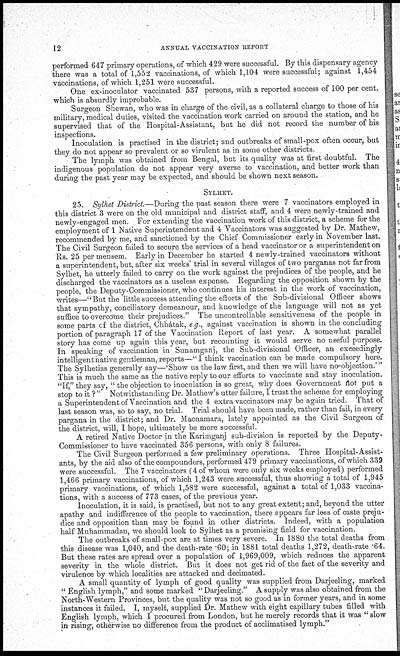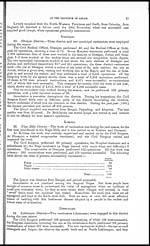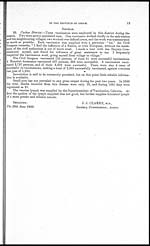Medicine - Vaccination > 1874-1927 - Annual vaccination report of the province of Assam > Vaccination report Assam 1874-1896 > 1881-1882 - Annual vaccination report of the Province of Assam for the year 1881-82
(46) Page 12
Download files
Individual page:
Thumbnail gallery: Grid view | List view

12 ANNUAL VACCINATION REPORT
performed 647 primary operations, of which 429 were successful. By this dispensary agency
there was a total of 1,552 vaccinations, of which 1,104 were successful; against 1,454
vaccinations, of which 1,251 were successful.
One ex-inoculator vaccinated 537 persons, with a reported success of 100 per cent.
which is absurdly improbable.
Surgeon Shewan, who was in charge of the civil, as a collateral charge to those of his
military, medical duties, visited the vaccination work carried on around the station, and he
supervised that of the Hospital-Assistant, but he did not record the number of his
inspections.
Inoculation is practised in the district; and outbreaks of small-pox often occur, but
they do not appear so prevalent or so virulent as in some other districts.
The lymph was obtained from Bengal, but its quality was at first doubtful. The
indigenous population do not appear very averse to vaccination, and better work than
during the past year may be expected, and should be shown next season.
SYLHET.
25. Sylhet District.—During the past season there were 7 vaccinators employed in
this district 3 were on the old municipal and district staff, and 4 were newly-trained and
newly-engaged men. For extending the vaccination work of this district, a scheme for the
employment of 1 Native Superintendent and 4 Vaccinators was suggested by Dr. Mathew,
recommended by me, and sanctioned by the Chief Commissioner early in November last.
The Civil Surgeon failed to secure the services of a head vaccinator or a superintendent on
Rs. 25 per mensem. Early in December he started 4 newly-trained vaccinators without
a superintendent, but, after six weeks' trial in several villages of two parganas not far from
Sylhet, he utterly failed to carry on the work against the prejudices of the people, and he
discharged the vaccinators as a useless expense. Regarding the opposition shown by the
people, the Deputy-Commissioner, who continues his interest in the work of vaccination,
writes—"But the little success attending the efforts of the Sub-divisional Officer shows
that sympathy, conciliatory demeanour, and knowledge of the language will not as yet
suffice to overcome their prejudices." The uncontrollable sensitiveness of the people in
some parts of the district, Chhátak, e g., against vaccination is shown in the concluding
portion of paragraph 17 of the Vaccination Report of last year. A somewhat parallel
story has come up again this year, but recounting it would serve no useful purpose.
In speaking of vaccination in Sunamganj, the Sub-divisional Officer, an exceedingly
intelligent native gentleman, reports—"I think vaccination can be made compulsory here.
The Sylhetias generally say—'Show us the law first, and then we will have no-objection.'"
This is much the same as the native reply to our efforts to vaccinate and stay inoculation.
"If," they say, " the objection to inoculation is so great, why does Government not put a
stop to it ? " Notwithstanding Dr. Mathew's utter failure, I trust the scheme for employing
a Superintendent of Vaccination and the 4 extra vaccinators may be again tried. That of
last season was, so to say, no trial. Trial should have been made, rather than fail, in every
pargana in the district; and Dr. Macnamara, lately appointed as the Civil Surgeon of
the district, will, I hope, ultimately be more successful.
A retired Native Doctor in the Karimganj sub-division is reported by the Deputy-
Commissioner to have vaccinated 356 persons, with only 8 failures.
The Civil Surgeon performed a few preliminary operations. Three Hospital-Assist-
ants, by the aid also of the compounders, performed 479 primary vaccinations, of which 339
were successful. The 7 vaccinators (4 of whom were only six weeks employed) performed
1,466 primary vaccinations, of which 1,243 were successful, thus showing a total of 1,945
primary vaccinations, of which 1,582 were successful, against a total of 1,033 vaccina-
tions, with a success of 773 cases, of the previous year.
Inoculation, it is said, is practised, but not to any great extent; and, beyond the utter
apathy and indifference of the people to vaccination, there appears far less of caste preju-
dice and opposition than may be found in other districts. Indeed, with a population
half Muhammadan, we should look to Sylhet as a promising field for vaccination.
The outbreaks of small-pox are at times very severe. In 1880 the total deaths from
this disease was 1,040, and the death-rate .60; in 1881 total deaths 1,272, death-rate .64.
But these rates are spread over a population of 1,969,009, which reduces the apparent
severity in the whole district. But it does not get rid of the fact of the severity and
virulence by which localities are attacked and decimated.
A small quantity of lymph of good quality was supplied from Darjeeling, marked
" English lymph," and some marked "Darjeeling." A supply was also obtained from the
North-Western Provinces, but the quality was not so good as in former years, and in some
instances it failed. I, myself, supplied Dr. Mathew with eight capillary tubes filled with
English lymph, which I procured from London, but he merely records that it was " slow
in rising, otherwise no difference from the product of acclimatised lymph."
Set display mode to: Large image | Zoom image | Transcription
Images and transcriptions on this page, including medium image downloads, may be used under the Creative Commons Attribution 4.0 International Licence unless otherwise stated. ![]()
| Permanent URL | https://digital.nls.uk/91524232 |
|---|
| Additional NLS resources: | |
|---|---|
| Attribution and copyright: |
|
|---|




